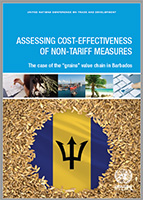
Barbados, as with many other countries in the Caribbean region and small islands developing states (SIDS), continues to grapple with the ‘triple crises’ of the COVID 19 pandemic, the war in Ukraine and the destabilizing impacts of climate change.
Together, these challenges have resulted in high rates of inflation and, in particular, escalating food prices. This has been further compounded by the disruptions in supply chains which led to higher shipping costs.
Non-tariff measures (NTMs), which often take the form of Sanitary and Phytosanitary measures (SPS) or Technical Barriers to Trade (TBT), can have the unintended consequence of adding additional burden and cost for compliance to the private sector, which can be passed onto consumers.
NTMs have a significant impact on international trade, influencing who trades what and how much. They have been described as being almost twice as trade restrictive as tariffs (WTO, 2012).
Understanding the implications of NTMs is essential to formulate effective development strategies that achieve Sustainable Development Goals. This is why UNCTAD has been at the forefront of identifying and classifying NTMs.
UNCTAD’s Toolkit Assessing Cost-Effectiveness of Non-tariff Measures was designed to conduct country-specific reviews of NTMs applicable to important imported intermediate products to a national value chain of interest.
“It aims to encourage good regulatory practices and support the design and implementation of quality regulations that achieve public policy objectives at as-low-as-possible compliance costs.
It is designed to provide governments and policymakers a framework in the form of a step-by-step deployment guide, including the tools needed for such an evaluation” (UNCTAD, 2020).
This study aims to identify and analyse NTMs applicable to imported grains that are also used as intermediate products in the poultry and bakery value chains in Barbados, with the goal of identifying potential areas for improvement in the design, implementation, and compliance processes of NTMs.
It is a pilot study for one particular sector and country, which can be similarly conducted in other sectors in the Organisation of Eastern Caribbean States (OECS) region and the CARICOM region.
It can also be conducted for NTMs related to imports to boost the competitiveness of a particular sector with the overall benefit of facilitation increases in exports regionally and internationally.
This study has been produced in the framework of the Joint SDG Fund under the programme: Barbados and OECS – Food Security and Livelihoods Resilience Through Analytical, Capacity Building and Policy Support in Response to the Global Crisis on Food, Energy and Finance with the support of the Government of Barbados.
The Joint SDG fund provided funding to UNCTAD to prepare this document.




